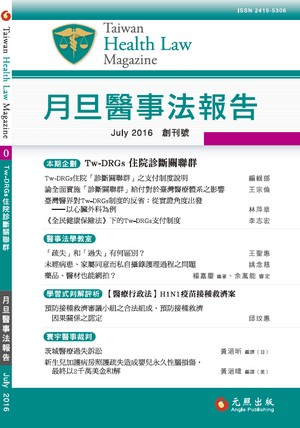茨城醫療過失訴訟【寰宇醫事裁判】 試閱
Medical Malpractice Lawsuit In Ibaraki, Japan
現為內科醫師的原告其妻,於縣內A、B兩醫院皆被診斷為左輸尿管結石。之後原告使用異於B醫院開立之藥物自行對妻進行治療。兩日後妻被送至C醫院急診,當時體溫已達40度,符合全身性炎症反應症候群(Systemic Inflammatory Response Syndrome, SIRS)4個症狀中的3個,CRP數值也超過30mg/dL,但負責的D醫師並未診斷出敗血症。之後妻雖轉送至E醫院,仍於一周後因敗血症休克死亡。後原告向水戶地院對C醫院與E醫院提出共6,400萬元的賠償要求。
一審水戶地院判定,C醫院之D醫師有未診斷出敗血症的誤診過失,但身為患者丈夫的原告作為醫師,對於妻子的生命、身體應該特別注意,認定原告必須負擔四成過失致死的責任。二審東京高等法院則以原告與妻之間原本就未締結正式的診療關係為由,變更判決為原告的責任相當於兩成。
The plaintiff is a physician. His wife was diagnosed left ureteral stone from hospital A and hospital B in Ibaraki. Afterwards, the plaintiff decided to treat his wife by himself with different drugs from what B hospital had described. Two days later, his wife was sent to the C hospital’s emergency room, her body temperature reached 40 degrees, her symptoms met 3 out of 4 criteria for systemic inflammatory response syndrome (SIRS), and her CRP value was more than 30mg / dL. But at that time the physician D did not diagnose sepsis. Although his wife was then transferred to E hospital, she still died of septic shock a week later. After that the plaintiff pressed charge to the Mito Court against hospital C and hospital E and demanded a total of 64 million yen compensation.
At the first trial the Mito Court determined that while doctor D in C hospital failed to diagnose sepsis, the plaintiff as a physician himself should have paid more attention to his wife, so he must bear 40% responsibility. At the second trial the Tokyo High Court changed the judgment for the plaintiff’s responsibility to 20%, for the plaintiff and his wife had never established any official or legal doctor-patient relation.
132-136






